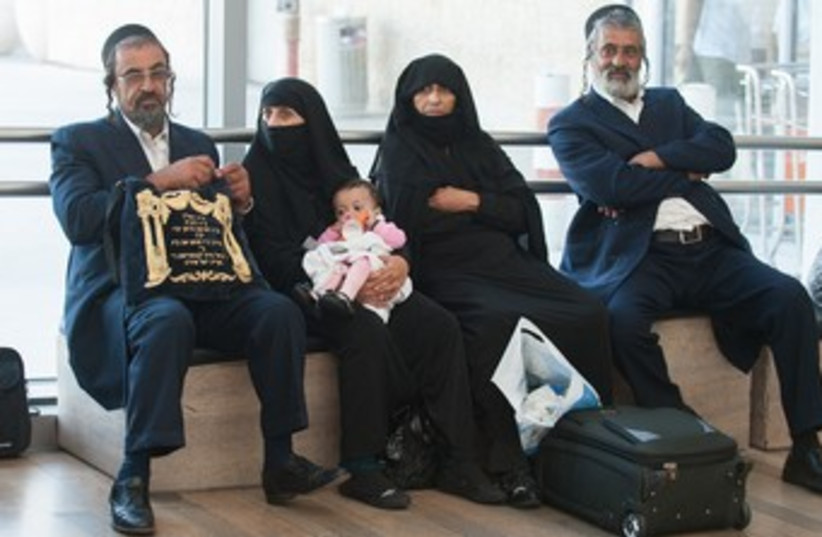As a former Israeli communications, satellite and cyber minister, I always took pride in helping all Jewish communities across the Islamic world. There are still Jews in Iraq, Egypt, Yemen, Syria, Bahrain, Tunisia and Iran. They do not declare themselves openly as Jews. They live discreetly. It is not easy to be Jewish in these countries and their lives are exceedingly difficult, hence the push to help them make aliyah.
One of the important things I did in my career was to work discreetly to bring the last generation of Jews from Rida, a city in Yemen, to Israel. No one knew about it, but I brought the rabbi from Rida, a local Jewish communal leader, to the Jewish state. I met with him together with Natan Sharansky, then the head of the Jewish Agency in Israel, and MK Ze’ev Elkin. I made a special agreement with Rabbi Yehia Nahari, the local Yemenite Jewish leader from Rida, on what terms every Jew comes back to Israel.
Later, he agreed to bring 21 Jews here on aliyah. In that meeting, we agreed on the money that we would give the Jews that left Yemen for Israel and we agreed with Sharansky that we would give the Yemenites more than any other Jews if they left quickly. I also met with the Rabbi Neheri and Ze’ev Elkin and we agreed about the plan to bring the Jews here. I told then-prime minister Benjamin Netanyahu that we together are working to bring the last aliyah from Yemen. At first, they thought I was joking, but I was ultimately successful with these steps to bring the aliyah about.
Around that time, the rabbi from Rida returned to Yemen. When he returned, a problem erupted, yet no one could talk about it without risking the lives of the Yemenite Jewish community. Yet, nevertheless, news about the incident leaked to the media and became a hit story. As a result, two Jews that were supposed to make aliyah were imprisoned in Yemen, together with the rabbi.
However, I did not leave the rabbi to rot in jail. I arranged for him to be brought to a hospital outside of Yemen, so he would not be forced to stay in jail. In this manner, we helped him to him to get out. In the end, he only came back to Israel with his wife. The other 19 only came after two weeks. Yet, thanks to my efforts, no Jew was left behind from this aliyah group. I waited for the aliyah flight to arrive at three o’clock in the morning. They kissed and shook hands with me upon arrival in Israel.
 Jews from Yemen to Israel 370 (credit: Moshe Brin /The Jewish Agency for Israel)
Jews from Yemen to Israel 370 (credit: Moshe Brin /The Jewish Agency for Israel)To this day, I have great love and respect for the Yemenite Jewish community, which is why I am delighted that the Association for Society and Culture, Documentation and Research together with the Economic Peace Center is hosting an event titled From Jewish Community in Azerbaijan to Yemenite Jews: A History of Two Communities. The lecture will feature the association’s president, Dr. Yigal Ben Shalom, alongside Dr. Mordechai Kedar, head of Israel Academia Monitor Dr. Dana Barnett, Lev Spivak of Aziz and a number of other prominent speakers.
The talks will be accompanied by Azerbaijani pastries and Yemenite food and music in the beautiful ornate atmosphere inside the Yemenite Museum on Kikar Ha’atzmaut in Netanya, on May 10 at 6 p.m. Members of the public are welcome. They should RSVP with our center.
About a year ago, I traveled to Azerbaijan and I was delighted to meet with Azerbaijani Jewish leaders, both in Baku and Red Village. I was impressed by the beautifully decorative synagogues alongside the hospitality and warm multicultural atmosphere, which celebrated differences rather than repressed them. Azerbaijan may be the only country in the world where the synagogues don’t have to lock their doors at night. This is how much antisemitism is non-existent in Azerbaijan.
As antisemitism has reached a record high in the United States and many other places, Israel must show appreciation and respect for Azerbaijan, a modern, tolerant, enlightened nation that borders the Islamic Republic of Iran, who routinely chants “Death to Israel and death to America.” Surrounded by a sea of totalitarianism, Azerbaijani President Ilham Aliyev has demonstrated a respect for Judaism that Yemenite Jews and Jews from other Arab states could only dream the leadership from their countries of origin could share.
It is a country that has helped Chabad to rebuild a fire-damaged synagogue in California, who finances Jewish communities and Christian communities just as much as Muslim communities within their state, and who systematically on every occasion denounces antisemitism, terrorism and all acts of violence against Jewish people, without exception.
Thus, I hope that Yemenite Jews alongside with other Jewish communities across the world can work to build a strong and friendly relationship with Azerbaijan, as at times like this, we should do everything possible to show our gratitude to Azerbaijan.
The writer served as communications, cyber and satellite minister under then-prime minister Benjamin Netanyahu. He currently is president of the Economic Peace Center.